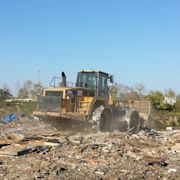Search results
Waste management or waste disposal includes the processes and actions required to manage waste from its inception to its final disposal. This includes the collection, transport, treatment, and disposal of waste, together with monitoring and regulation of the waste management process and waste-related laws, technologies, and economic mechanisms.
Mar 29, 2024 · solid-waste management, the collecting, treating, and disposing of solid material that is discarded because it has served its purpose or is no longer useful.
Mar 24, 2024 · What Is Waste Management? The four major waste types are MSW, industrial waste, agricultural waste, and hazardous waste. Waste management refers to the streamlined processes used to safely manage and dispose of them, which include recycling, reusing, composting, and incinerating.
Nov 22, 2023 · EPA developed the non-hazardous materials and waste management hierarchy in recognition that no single waste management approach is suitable for managing all materials and waste streams in all circumstances. The hierarchy ranks the various management strategies from most to least environmentally preferred.
Improving waste management practices can also help us to reduce the amount of raw materials generated. By recycling, we can reduce (although not eliminate) the production of new resources. To protect the world’s ecosystems – and our health – we need to ensure that waste is managed correctly.
Jan 12, 2024 · Waste management is a term that refers to all of the various actions taken and plans created to manage waste, from composting or recycling existing waste to minimizing the production of waste in the first place. You’ll sometimes hear “waste management” used interchangeably with “waste disposal,” but that’s not quite accurate.
At Waste Management we provide residential customers with superior garbage collection and waste collection services as well as dumpster rental.







